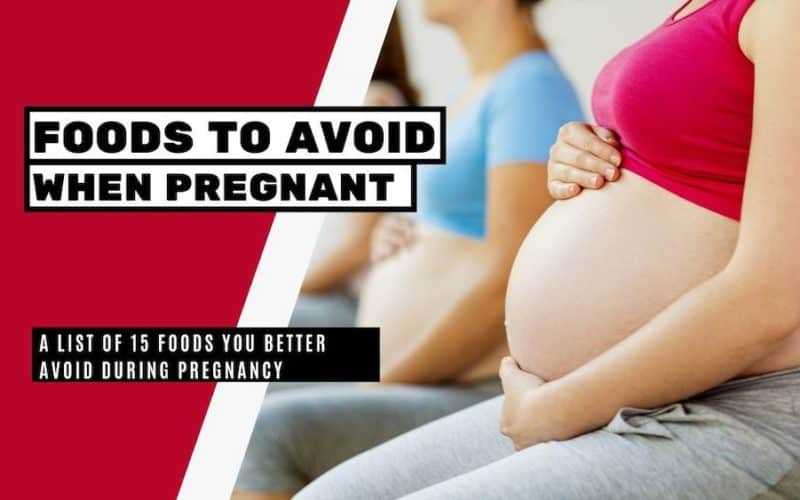Do you know which foods to avoid when pregnant? Yes, you need to be conscious while making choices for meals during pregnancy because some foods may harm you and your baby’s health. In this article, we will discuss a list of fifteen foods you better avoid during pregnancy.
Pregnancy is the most sensitive and crucial time in a woman’s life, so one should know foods to avoid during pregnancy. Everything you eat is shared with the baby growing inside you and can affect your baby’s growth and development.
While taking supplements and a healthy balanced diet, you must know which foods to take with precautions while you are pregnant.
Table of Contents
- Foods to Avoid When Pregnant:
- 1. Kinds of Seafood High in Mercury
- 2. Undercooked or Raw Fish
- 3. Cheese to Avoid in Pregnancy
- 4. Raw or Undercooked Eggs
- 5. Raw or undercooked processed meat
- 6. Unpasteurized Milk and Other Products
- 7. Processed Junk Foods
- 8. Supplements and Vitamins
- 9. Liver and Related Products
- 10. Caffeine
- 11. Alcohol
- 12. Herbal tea
- 13. Paté
- 14. Raw Sprouts
- 15. Unwashed Fruits and Vegetables
Foods to Avoid When Pregnant:
1. Kinds of Seafood High in Mercury
Seafood is a rich source of omega-three fatty acids and protein. It promotes the baby’s brain and eye development (1, 2). But certain fish are high in mercury and adversely affect the baby’s development.
Mercury is highly toxic, and there are no safe levels of exposure. It adversely affects the nervous system and kidneys (3). The large-sized marine fish can accumulate high levels of mercury. These include:
- Shark
- Swordfish
- Marlin
- Tuna
Seafood is healthy. However, any kind of food with high mercury should be avoided when pregnant. Choose one which contains less mercury and always prefers properly cooked seafood. Some safe seafood in pregnancy:
- Salmon
- Shrimp
- Pollock
- Trout
- Cod
- Herring
- Pacific oyster
You can have two to three servings a week.
2. Undercooked or Raw Fish
Always choose fully cooked seafood during pregnancy. You may get a viral, bacterial, or parasitic infection by eating raw fish, especially sushi or shellfish, if not adequately processed—listeria and Salmonella are notorious for this source.
- Listeria is pregnancy: If you are pregnant, you are more susceptible to listeria infection. It can pass to your baby through the placenta and can cause a lot of health problems such as preterm delivery and stillbirth. Meanwhile, you may not feel any symptom of it.
- Safe Varieties of Sushi: Raw or lightly cooked sushi can be safe in pregnancy only when it has been frozen first. The reason behind this is certain wild fish may contain parasites that are killed in the freezing process. But if you are not sure about that and want to be on the safest side choose fully cooked or vegetarian varieties.
3. Cheese to Avoid in Pregnancy
Soft cheeses contain more moisture and are less acidic, which is more likely to harbor bacteria such as listeria.
- Soft cheese with white rind: You should avoid mold-ripened soft cheese, for example, brie and Camembert. It includes mold-ripened soft goats’ cheese, such as chèvre. These cheeses are only safe to eat in pregnancy if they’ve been cooked thoroughly until steaming hot through.
- Soft blue cheeses: You should also avoid soft blue-veined cheeses such as Danish blue, Gorgonzola and Roquefort. If they’ve been cooked thoroughly, until steaming hot all the way through, they are safe to use in pregnancy.
4. Raw or Undercooked Eggs
Raw eggs can be a source of salmonella infection so it is better to avoid during pregnancy. You should avoid eating raw or partially cooked eggs, especially when you are not sure of the source and its hygiene.
Salmonella food poisoning can cause severe diarrhea and vomiting, which will indirectly affect the health of your baby too.
The foods containing raw eggs include; Lightly scrambled eggs, Poached eggs, Hollandaise sauce, Homemade mayonnaise, Salad dressings, Homemade ice cream, and Cake icings. Non-hen eggs such as goose, duck, and quail eggs should never be consumed raw and always be cooked thoroughly.
5. Raw or undercooked processed meat
Do not eat undercooked, raw, or processed meat during pregnancy. There is a potential risk of getting bacterial or parasitic infections. Bacteria are found on the surface of raw meat, and some may penetrate inside of meat chunks.
Toxoplasmosis is an infection caused by a parasite found in raw and undercooked meat. It may severely harm your baby (4).
Always cook meat thoroughly and make sure no area remains undercooked or red. Wash your hands and all utensils used in the handling of raw meat.
6. Unpasteurized Milk and Other Products
Unpasteurized milk or any milk product such as soft cheese, homemade yogurt, or juices foods should be avoided during your pregnancy. Milk and yogurt are healthy and nutritious; just make sure these are made of pasteurized or ultra-heat treated (UHT) milk.
They can contain a lot of harmful bacteria; listeria, salmonella, or E. coli (5, 6). Infection of these bacteria can have severe life-threatening consequences for your baby. The only safe way to get rid of all these bacteria without changing its nutrition value is Pasteurization (7).
7. Processed Junk Foods
So, as you are pregnant and need some extra calories to fulfill the demands of yourself and your baby, it doesn’t mean that you have to eat for two people.
You need only 300-500 extra calories per day in 2nd and 3rd trimester (8). The critical thing to focus on is a balanced whole food diet rich in nutrients and not just calories.
Processed and junk foods are just boxes of extra calories with added sugars and excess fats and deficient in essential nutrients, which are vital for you and your baby’s growth and development.
Generally, you should avoid junk food because they have been linked to causing a lot of morbidities such as obesity, heart diseases and type 2 diabetes mellitus (9, 10).
If you eat a lot of junk food in pregnancy, you have an increased risk of developing gestational diabetes, overweight baby, and along with it, a lot of pregnancy and birth complications (11, 12) Eat healthy and natural foods in their richest nutrient form.
8. Supplements and Vitamins
Do not take high doses of vitamin A supplement, fish oil, or multivitamins when you are pregnant. An excessive dosage of vitamins is toxic, particularly vitamin A toxicity can cause congenital disabilities and malformations. Use safe levels with the consultation of your doctor (13).
9. Liver and Related Products
Avoid liver and liver products such as liver pâté and liver sausage because they contain too much animal-based vitamin A which may be toxic in high amounts for your baby. Several studies have indicated that fish liver oil or liver products can cause vitamin toxicity.
10. Caffeine
Limit the use of caffeine per day to 200 mg. Caffeine is readily absorbed through the placenta, and your baby is immature and cannot metabolize all.
If large amounts accumulate, it can restrict the growth of your baby. So, there is a risk of your baby having low birth weight and consequently increased risk of miscarriages and a lot of other issues (14, 15, 16).
Caffeine is naturally present in a lot of foods;
- Coffee
- Tea
- Chocolate
- Energy drinks
- Soft drinks
A mug of instant coffee contains approximately 100 mg and a mug of tea 75 mg of caffeine. A 250 ml energy drink contains 80 mg. You can have 2-3 small cups of coffee alone per day or one coffee and one energy drink. Remember that green tea also contains the same amount of caffeine as regular tea.
If occasionally you happen to have more than limit, it is ok but try to cut down or use decaffeinated tea and coffee, fruit juice or mineral water instead of regular tea, coffee, cola, and energy drinks.
11. Alcohol
If you are pregnant or planning to be, the safest way is abstaining from it. No safe levels of alcohol have been recommended.
As you drink, alcohol freely passes through the placenta, and your baby’s liver is immature and cannot metabolize it. When accumulated in large amounts, it severely affects development.
In the first three months of pregnancy, drinking alcohol increases the risk of miscarriage, premature birth, and low birth weight. Drinking throughout pregnancy leads to fetal alcohol syndrome (17, 18).
How to Avoid Drinking in Pregnancy?
Well, it’s not that difficult as many women go off-taste of alcohol at the start of pregnancy. Most women give up alcohol as they are planning to become pregnant. After knowing and understanding facts and hazards, it is easy to avoid.
Moreover, the severity of abnormalities is directly associated with the amount of alcohol you have. Drinking less heavily on a single occasion may be associated with a less severe form of the syndrome.
If you have difficulty cutting down your alcohol, talk to your doctor, physician, or midwife. Join maternity support groups in your local community.
12. Herbal tea
Avoid Herbal supplements and herbal tea to be on the safe side. There is not enough factual research data available on their safety levels during pregnancy. You don’t know which chemical may be allergic or react with your baby.
They can also interact with certain medicines you are taking. If you are not sure of safety levels, you should consult your local GP or midwife.
13. Paté
Avoid all types of pâté, including vegetable pâté and liver pâté in pregnancy. They may be a source of certain bacteria such as listeria, which causes severe illness to yourself and your baby.
14. Raw Sprouts
Raw sprouts, including alfalfa, clover, radish, and mung bean sprouts, maybe a source of salmonella. These sproutings grow in the humid environment required by seeds, which is an ideal environment for bacteria to grow, and they cannot be washed off from them.
However, you can eat them safely when cooked. Just avoid raw sprouts (19, 20).
15. Unwashed Fruits and Vegetables
When you are pregnant, you should strictly follow the standard hygiene rules to minimize the risk of contracting any type of infection. Always wash fruits and vegetables thoroughly before eating.
The surface of unwashed or unpeeled fruits and vegetables may be contaminated with several bacteria and parasites, including Toxoplasma, E. coli, Salmonella, and Listeria, which can be acquired from the soil or through handling.
Toxoplasmosis: One very dangerous parasite that may linger on fruits and vegetables at any time during production, harvest, processing, storage, transportation, or retail is called Toxoplasma ((19). It can harm both the mother and her unborn baby.
The majority of people may not feel any symptom or have mild flu, but infants show signs of blindness or intellectual disabilities later in life. A small percentage of infected newborns have the severe eye or brain damage at birth (21).
While you are pregnant, it is essential to minimize the risk of infection by thoroughly rinsing, peeling or cooking fruits and vegetables (23).
Certain foods are likely to be contaminated and are very difficult to be sure if they are hygienically safe. And some foods contain toxic levels of nutrients and constituents that you may be able to tolerate usually, but your baby cannot metabolize them.
It is vital to remember which foods to avoid during pregnancy to minimizing the risk of infections or causing harm to your growing baby. Remember this list because the health of yourself and your baby comes first.





